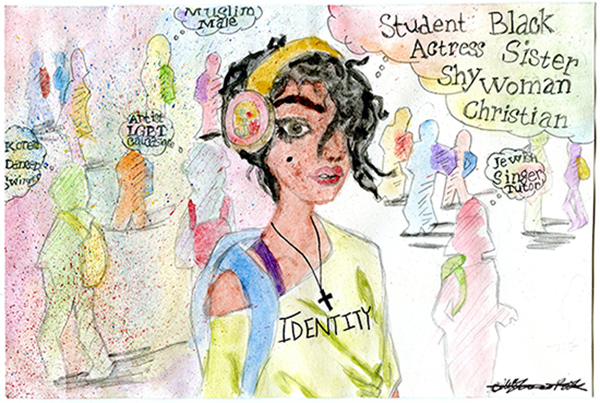Administration jump-starts identity initiative

December 22, 2017
Starting this school year, identity will be the organizational focus for the faculty and staff, according to Principal Dr. Lauren Fagel. The initiative is designed to help students feel secure in their personal identity, Fagel says.
“That’s kind of what [the identity initiative] is all about: helping students think about and grow their own identity, recognize it and shape it, all towards reaching their full potential,” Fagel said.
At a meeting on Nov. 6, the identity initiative was introduced to all teachers through a panel of participating faculty members. On Nov. 15 the entire staff met in small groups to engage in activities to stimulate conversation about student identity and their own identities, Fagel says.
“[The small groups were] a way to get the whole staff thinking about what type of work they’re doing or what type of work they might want to do to help students to maximize their own potential,” Fagel said.
While the identity initiative has just begun and the development of projects and plans will be ongoing, the initiative already includes several programs in different departments, including courses and extracurricular activities. One such plan is Puentes, “bridges” in Spanish, which includes a mentoring program developed by Spanish Teachers Gabby Mikos and Veronica Reyes to provide opportunities for Latino students and others, according to Reyes. Mikos conveys that the program was initially developed to provide equity and opportunities for Latino students.
“As a faculty, we’ve looked at the different facets of identity, and one of them is equity. We’ve noticed that [equal opportunities are not available] for some students, and not just the demographic that we’re working with but various demographics,” Mikos said. “That’s when we came together [and] went to conferences, and we said, ‘What can we do to better help this group of students to be able to have the same opportunities as everybody else here at GBS?’”
According to Mikos, Puentes is in its pilot year and so far includes 11 students and eight teachers. Mikos says that some of the biggest goals of the program include encouraging students to take more risks and leadership roles in the GBS community, but not all the goals are academically based.
“We don’t want it to be just this mentorship that’s grade-driven, because that’s not the point of this initiative,” Mikos said. “It’s very much ‘How do I become an overall successful Titan academically, socially, emotionally, mentally and really become part of the GBS community?’”
Reyes says that another objective of Puentes is to help participants form lasting relationships with their mentors.
“What we’re hoping for is that the relationships that they’re forming are long-lasting within the four years that they’re here but also beyond,” Reyes said. “Eventually, if all of it is successful, [our goal is] to be able to open it up to the entire student population.”
Another change that has come out of the identity initiative was the club previously named Gay Straight Alliance (GSA) changing its name to Sexuality and Gender Alliance (SAGA). According to SAGA Co-sponsor Heather Chambers, the purpose of the name change was to be more inclusive towards all members of the club.
“It was a whole group initiative in identity to make sure our club includes all identities, not just gay or straight,” Chambers said. “We wanted to make sure we were including gender identities that we also support, sexual orientations and all the allies.”
According to SAGA Co-sponsor Matthew Bertke, the name SAGA most represented the core beliefs and the members of the club. Bertke conveys his hopes for the initiative and SAGA in the future.
“I hope for people to be aware,” Bertke said. “We’re all Titans, and we should all not only feel safe in this building but actively make this a safe space by not bullying, calling names and accepting everyone for who they are.”
In addition to Puentes and SAGA, a third plan in the identity initiative is the structure of a new civics course next semester, according to Tara Tate, social studies teacher and Civics team leader. She says that much of the curriculum of the course is centered around current events and the identity of students as citizens.
“My hope is that by the end of that semester, our focus is on students’ identity as a citizen, [and] that they’ll know who they are as a citizen,” Tate said. “Right now our political and social climate is so much about identity, and I think in order for us to achieve the most out of our students, finding ways for them to establish a strong identity, whether it’s tied to race, religion, sexual orientation, even just who they are politically, is the best way for us to achieve the ultimate goal of academic achievement.”
According to Tate, her wish is not only that identity will be the focus of certain programs, but that teachers will foster student identity on a daily basis in their classrooms.
“The hope is that every student would see the impact of [the initiative] in multiple ways,” Tate said. “Certainly there will be initiatives that are codified or written into the curriculum but the hope is also to [acknowledge identity] within our informal actions everyday with students.”
According to Fagel, the main intent of the identity initiative is to encourage teachers to understand students’ identity in addition to helping students foster their own identity.
“My hope is that [the initiative] makes the adults in the building more aware of what students need in order to be successful and also helps remove barriers that we recognize might be in the way of students,” Fagel said.


